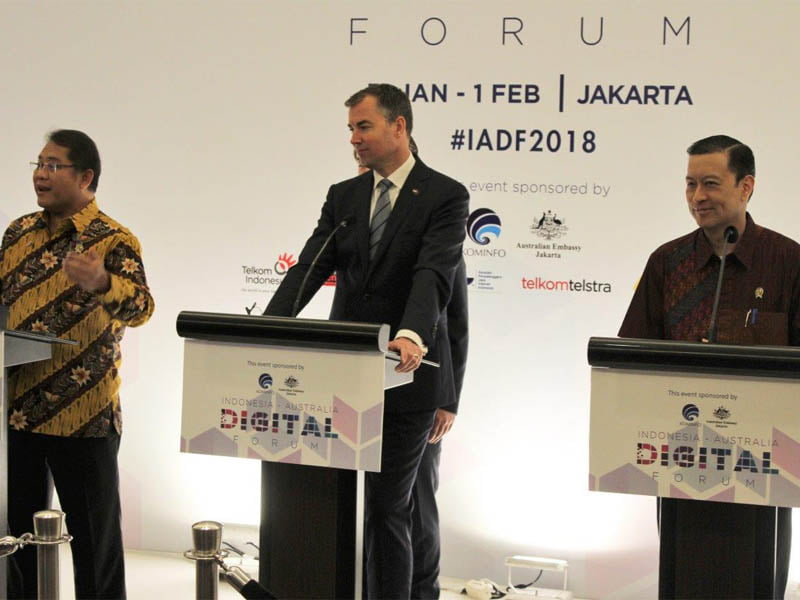Michael Keenan has delivered his first major speech on digital transformation – in Jakarta of all places – since being given the portfolio in Prime Minister Malcolm Turnbull’s ministerial reshuffled in December.
In addition to his appointment as Minister for Human Services, Mr Keenan is also Minister Assisting the Prime Minister on Digital Transformation.
The reshuffle effectively put Mr Keenan in charge of the largest service delivery organisations – including Centrelink, Medicare and the Child Support Agency – as well as carriage of the transformation elements from the Department of Prime Minister and Cabinet, including responsibility for the Digital Transformation Agency, as well as policy related to data and digital identity.

The reshuffle put the leadership of government’s digital transformation agenda inside the Cabinet for the first time. Which is a good thing, of course, and a promotion of sorts for the portfolio.
Putting the digital transformation agenda under the same minister as a primary service delivery department adds gravitas to policy implementation. It is a move that should reduce the turf conflicts that have dogged the DTA/Human Services relationship and previously stifled the agenda.
Mr Keenan will also chair a powerful new Cabinet sub-committee – the Digital Transformation and Public Sector Modernisation Committee – to be made up of the ministers responsible for five central government agencies.
It is worth noting that the Cabinet sub-committee that had previously dealt with digital transformation issues had been chaired personally by the Prime Minister, as it has been an area of passionate interest to Malcolm Turnbull from even before the 2013 election.
While you wouldn’t want to read too much into the decision to step down from chairing the committee – Prime Ministers are busy people, after all – it is worth highlighting nonetheless.
Speaking on the sidelines of the Indonesia-Australia Digital Forum in Jakarta last week, Mr Keenan told InnovationAus.com that the government’s agenda focused on four key priorities; Digitising more government services, delivering better government services, improving the return on ICT investment, and harnessing the power of data.
Needless to say, the new minister has been on an ultra-steep learning curve in the new portfolios since the reshuffle was announced just before Christmas.
These portfolios draw intense public scrutiny, and you have to feel for a new minister. In this interview with InnovatioAus.com, Mr Keenan’s comments can be seen as both innocuous and controversial, depending on your view about how best to drive transformational change within government.
Despite whatever challenges he has inherited as Human Services minister – like the controversies over the robot-debt systems or the long wait times on calls to Centrelink – Mr Keenan says the glass is half-full.
Just two months into the new role, he is adamant that the service delivery within DHS agencies “is actually pretty good.”
While there is always room for improvement, Mr Keenan says media criticism has been overblown.
He says putting the DHS portfolio under the same minister as the digital transformation agenda is a good thing. It adds the weight of DHS to the central co-ordinating role of PM&C.
“Human Services is where people actually interact with government. If you’re dealing with the government, in the vast majority of cases that’s going to be through the Department of Human Services,” Mr Keenan told InnovationAus.com.
“And the whole idea of digital transformation … means easier access to services, better services and more convenient services. And services that are better suited to the digital age,” he said.
“That’s the reason they were combined (under one minister). It makes perfect sense. DHS is an enormous ICT shop in its own right, with almost 4,000 ICT people [working in it].
“And to the two agendas are completely and utterly inseparable,” Mr Keenan said. “If we are going to use digital technologies to improve government, to improve services and to make people’s lives better, then it is going to be DHS that is implementing that.”
Government is not promising revolutionary change through its digital transformation agenda and Mr Keenan tempers expectations by saying improvements in service delivery within DHS will be through “incremental advances.”
“I think the service is actually pretty good, that’s my impression,” he said.
“The perception among some in the media – and perhaps even some of the population – that the service is substandard is wrong.”
I think people’s experiences are generally not bad, but we will be making incremental improvements to it, and we will be using technology to do that.”
In his speech to the Indonesia-Australia Digital Forum, Mr Keenan outlined an expanded emphasis on data policy, both through the increased use of data analytics across the silos of government, as well as an accelerating program of making data sets available to the private sector.
Data policy and the implementation of the Data Integration Partnership of Australia (DIPA) program – which was funded to $130 million over three years in the 2017 Budget – are priorities. He said data policy rightfully remained within PM&C, given its somewhat unique ability to “crack heads together” as the central coordinating department.
“DIPA will serve as a catalyst to drive change to the way government uses, shares and analyses data,” he said.
“The government should not hoard data, the vast store of information we have is a national resource providing enormous opportunity for the public and private sectors.”
“DIPA is a coordinated investment to maximise the use of this asset. We have already established three data analytical units that will use integrated data to solve complex policy issues in areas such as industry, health and welfare, and the environment.”
Mr Keenan said Centrelink used data analytics to look at complaints, establish patterns and then using that information to improve services.
“Better use of data will help to provide answers to complex policy challenges both now and in the future.”
InnovationAus.com traveled to Jakarta at our own expense to cover the Indonesia-Australia Digital Forum.
Do you know more? Contact James Riley via Email.

